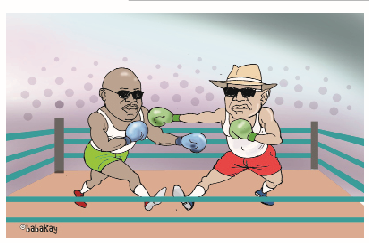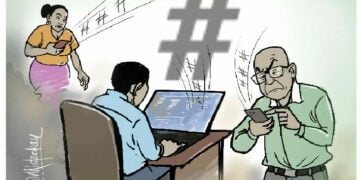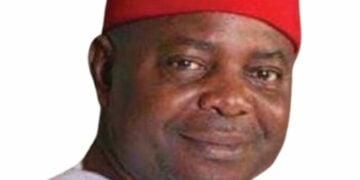The feud between the former governor of Rivers State and current Minister of Federal Capital Territory (FCT), Nyesom Wike, and Governor Siminalayi Fubara has dominated the headlines the past couple of weeks, with no solution in sight. The political dogfight has led to moves to impeach Governor Fubara, the decamping of 27 PDP members of the State legislature to APC and the consequent declaration of their seats vacant by a factional Speaker of the State House of Assembly loyal to Governor Fubara, the demolition of the State House of Assembly complex and fears that the conflict is increasingly assuming an ethnic dimension. Attempts by President Tinubu to mediate in the conflict have failed to douse the tension.
There are several issues raised by the Wike-Fubara political dogfight:
One, keen observers of Rivers’ State politics do not feel surprised at the pernicious falling out between Nyesom Wike and his political godson, Siminalayi Fubara. In fact what is happening between Wike and Fubara seems to be part of the DNA of Rivers’ State politics especially in the relationship between political godfathers and political godsons in the state where, since 1999, political godsons have always succeeded in running their erstwhile political godfathers out of town. For instance Dr Peter Odili, the first civilian Governor of Rivers State in this current cycle of liberal democracy managed to neutralize his erstwhile godfather, the late Harry Marshall just as he was driven out of town after his tenure by Rotimi Amaechi, who was his political godson. Nyesom Wike, an erstwhile Chief of Staff and political enforcer for Rotimi Amaechi also fought and neutralized Amaechi, his former political godfather in a bitter feud that has lingered for over eight years.
RELATED: Don’t Pull The Ladder, Wike Warns Fubara
Another seeming trait in the DNA of Rivers politics is that all the Governors of the State since 1999 (apart from Celestine Omehia who had a brief rule from 29 May 2007 to 25 October 2007) nursed the ambition of being President of the country and spent lavishly to achieve that ambition.
Two, strictly speaking, the issue of godfatherism, (or ‘my oga at the top’ phenomenon) is not alien to the various indigenous cultures in the country. While the terminology in our various indigenous languages will be coterminous to a ‘mentor’ or ‘guardian’, in Nigerian politics, it is about power brokers, a patron-client and transactional relationship in which the main goal is for both the client and the patron to use each other to attain selfish goals that have little to do with the general societal good. Like any business deal, political godfathers invest in their ‚godsons‘, deliver their own part of the bargain (usually elective or appointive office) and expect returns on investment. Across the country, political godfather versus godson feud has hardly favoured the godfather. The epic godfather versus godson dogfights since 1999 include Governor Chimaroke Nnamani of Enugu and his political godfather, Senator Jim Nwobodo; Governor Mala Kachallah of Borno state and his godfather Senator Ali Modu Sherriff, (popularly known as ‚SAS)‘; Governor Chris Ngige and his political godfather Andy Uba in Anambra State, Governor Willie Obiano and his political godfather Peter Obi in Anambra State; former Governor Rauf Aregbesola and his political godson, Gboyega Oyetola in Osun State; Governor Babatunde Fashola and his political godfather Bola Ahmed Tinubu (who also stopped another political godson, Ambode from getting a second term in Lagos State); former Governor Akpabio and his political godson Emmanuel Udom ; Orji Uzor Kalu of Abia State and his former godson, Theodore Orji; Chimaroke Nnamani and his political godson Sullivan Chime in Enugu State, Kwankwaso and his former political protégé Ganduje in Kano State, Adams Oshiomhole and his former political godson Godwin Obaseki in Edo State; former Governor Wamakko and his former political boy Aminu Tambuwal in Sokoto State; former Governor Imoke and his former political scion Ayade in Cross Rivers state; former Governor Akume and his political godson Suswan in Benue State and the late Governor Mbadinuju and his political godfather Emeka Offor in Anambra State. With the exception of Tinubu in Lagos, nearly all the other fights between political godfathers and political godson Governors ended in favour of the latter. Of course some political godfathers who could not remove outright their ‘recalcitrant’ political godsons aligned with other forces either to thwart their former scion’s second term ambition or to get them removed by the election petition tribunals.
Given that godfather versus godson political dogfight is almost inevitable, and that the godson as Governor almost always wins, why do people still want to play the role of godfathers? In particular why will Governors who are about to conclude their tenures be hell bent on selecting and installing successors when the history of the relationship between the political godfather and the political godson rarely favours the former after the election? One possible explanation is that Governors concluding their tenure must have figured out that it may be riskier for someone they did not anoint or install to succeed them than someone they handpicked turning against them with time. The short term benefits of installing a successor by a departing Governor may include covering the backsides of the departing Governor from anti-graft agencies like the EFCC or giving such a Governor at least temporary relief from damaging revelations.
Three, there are fears that the audacity with which Wike is going after Fubara so soon after the elections may be a signpost of the return of the more crude form of godfatherism, which characterized the early years of this cycle of liberal democracy in the country (1999-2007). That form of godfatherism, which can best be described as ‘machine politics’, is a form of politics characterized by tight organization and a strong centralized leadership, typically in the form of a “boss”, with the organization/network dominating the landscape, mafia-style. Tinubu is arguably Nigeria’s most successful political godfather, having been responsible for choosing all the Governors of Lagos State since he completed his tenure as Governor in 2007 and having also played a significant role in the emergence of most of the Governors in the South-west and beyond. Having used the networks he created as godfather of Lagos politics to expand his influence beyond Lagos to some other parts of the country and eventually used that network to become the President of Nigeria, it is possible that some ambitious politicians may be thinking of replicating the Tinubu template in their domain with the hope of using it to also achieve national political power.
If this assumption is correct, we may likely see an increasing ‘mafianization’ of Nigerian politics by moneybags and former political office holders, especially former Governors, as the new groups compete for influence and networks in their domains and beyond.
Four, what is the impact of godfatherism in Nigerian politics? Besides the possible ‘mafianization’ of Nigerian politics and all it portends, the cost of ‘oiling’ the structure of the political godfather, (usually by the political godson thieving state resources), could be prohibitive and undermining of development efforts. Similarly, since political godfathers are people who not only have tremendous resources to fund elections but also people who claim to know how to ‘win’ elections Nigerian-style and how to manage the violence that often attends electoral competition in the country, the seeming return of ‘machine politics’ could accelerate the current alienation of citizens from the state and its politics. It will also further discourage otherwise competent professionals from getting involved in elective offices.
Five, the current feud in Rivers state could further hurt the image of President Tinubu who has not sufficiently recovered from the controversies that dogged his candidacy during and after the elections. Given the controversy over the role of Wike in the electoral umpire declaring that Tinubu won Rivers’ State, popular grapevine and social media talks is that Wike was given the powerful FCT Ministry not just to compensate him for his role in Tinubu winning the last election but also that his being made the FCT Minister is to ensure that he uses the Rivers’ State’s template to ensure that the APC wins the FCT in 2027 (to avoid the embarrassment of not winning or securing 25% of the votes in the FCT which was one of the grounds of the petitions against him at the Presidential Election Petition Tribunal). It is also believed that the Tinubu government is tacitly supporting his bid to retain the control of the political structures of both the PDP and the APC in Rivers State for the same reason. All these are likely to derogate from the already narrow legitimacy base of the President, especially if the current hardship persists and the myth about his competence continues to wane.
_________________
Jideofor Adibe is Professor of Political Science and International Relations at Nasarawa State University, Keffi and Extraordinary Professor of Government Studies at North Western University, Mafikeng South Africa. He is also the founder of Adonis & Abbey Publishers (www.adonis-abbey.com) and publisher of the online newspaper, The News Chronicle (www.thenews-chronicle.com). He can be reached on 0705 807 8841(Text or WhatsApp only).





